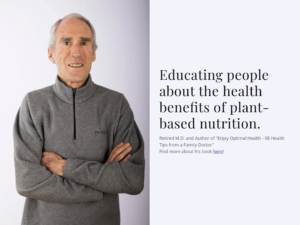Health column by Dr. Greg Feinsinger. Champion of Whole Food Plant Based Living and righteous person.
There are 3 macronutrients (large nutrients, that you can see): protein, carbohydrates, and fat. Today’s column is about protein, and will attempt to set the record straight on the many misconceptions surrounding it. This column is based on Dr. Michael Greger’s evidence-based website nutritionfacts.org (search protein on it if you’re interested), his 2015 book “How Not to Die,” his new book released last month “How Not to Diet,” and former elite triathlete Rip Esselstyn’s book “The Engine 2 Seven-Day Rescue Diet.”
Proteins are made up of various configurations of 20 building blocks called amino acids. Our bodies can synthesize 11 of these, which are called non-essential amino acids. We have to get the other 9 in our diet—these are called essential amino acids. There are over 10,000 different kinds of protein in our bodies, each with a specific role. Protein is important in the structure of almost every part of the human body—for example tissues such as hair, muscle, bone, and skin; as well as things like enzymes, hormones, and antibodies.
The official recommendation for daily protein intake is 0.8 grams per kilogram of body weight, which would be 50 grams for a 150-pound person. In addition to the amino acids and protein we take in as food, our bodies have large pools of free amino acids floating around to use as building blocks. Furthermore, each of us has a built-in recycling program of 90 grams of protein that are dumped into our system every day, from breakdown of cells and tissues.
Following are some of the common myths surrounding protein, followed by what we now know are the facts:
- MYTH, PLANT PROTEINS ARE INCOMPLETE. FACT: This myth comes from rat studies done over a century ago, and was disproven decades ago. All plant proteins contain every one of the essential amino acids. As the American Dietetic Association says, “plant sources of protein alone can provide adequate amounts of the essential and nonessential amino acids.”
- MYTH: IN ORDER TO GET ALL THE ESSENTIAL AMINO ACIDS FROM PLANTS, WE NEED TO COMBINE DIFFERENT PLANT PROTEINS, SUCH AS RICE AND BEANS. FACT: The ONLY source of protein that is incomplete is gelatin, so no, you can’t live on Jello alone.
- MYTH: WE NEED LARGE AMOUNTS OF PROTEIN IN OUR DIET EVERY DAY. FACT: This myth is spread by false but effective advertising by the meat and dairy industry. People on the standard American diet get 30 percent of their calories from protein, but a healthier percentage would be 5-10. Okinawans are some of the longest-lived people in the world, and just 7 percent of their calories come from protein. The average American gets too much protein—100 grams a day for men, 70 grams for women. This excess of mainly animal protein contributes to several health problems.
- MYTH: ATHLETES NEED MORE PROTEIN THAN THE REST OF US. FACT: Due to training and competing, elite athletes burn up more calories every day and therefore need to eat more calories, so 10 percent of their higher calorie intake would involve additional protein. The extra protein can easily be obtained from plant sources.
- MYTH: PROTEIN PROVIDES ENERGY. FACT: Energy comes from carbs or fat, not protein.
- MYTH: IN ORDER TO AVIOD LOSS OF MUSCLE MASS, OLDER ADULTS NEED TO INCREASE THEIR PROTEIN INTAKE. FACT: This has been disproven. Age-related muscle loss results from inactivity, not lack of protein.
- MYTH: PREGNANT WOMEN AND INFANTS NEED EXTRA PROTEIN. FACT: High protein diets during pregnancy contribute to premature birth and low birth-weight infants. Excessive protein during pregnancy also contributes to obesity when these infants become adults. Meat and fish protein in pregnant women cause a lifelong elevation of the stress hormone cortisol. The perfect food for infants is human breast milk, which less than 1 percent protein by weight—the lowest percentage of protein in any mammalian milk.
- MYTH: ANIMAL PRODUCTS HAVE MORE PROTEIN THAN PLANTS. FACT: When you look at protein per calories, plants win—e.g. broccoli has more protein per calorie than steak.
- MYTH: PLANT PROTEINS ARE SOMEHOW INFERIOR TO ANIMAL PROTEINS. FACT: Not true. Look at big, strong animals that are 100 percent plant-based such as elephants, gorillas and horses. Animal proteins—but not plant proteins–are linked to most of the chronic diseases we suffer and die from, including obesity, diabetes, osteoporosis, many types of cancer, chronic kidney disease, cardiovascular disease and dementia.
- MYTH: REAL MEN EAT MEAT. FACT: Animal protein lowers testosterone levels. Animal protein clogs and narrows arteries, resulting in erectile dysfunction, among other things. Watch the recently-released documentary The Game Changers, about elite athletes who have gone plant-based to enhance their athletic performance—including endurance athletes, many NBA players, some NFL players, and the strongest man in the world Patrik Baboumian. Even The Terminator, Arnold Schwartzenegger, is now plant-based.
Bottom line: We need protein in our diet, but not too much, and plant proteins are best.

Leave a Reply